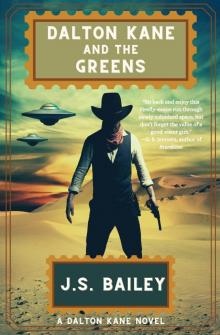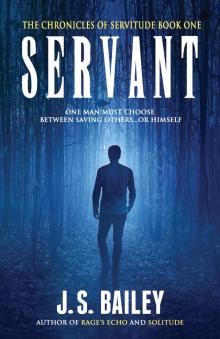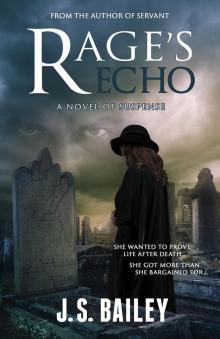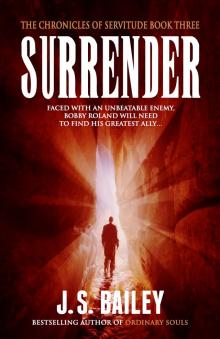- Home
- J. S. Bailey
Dalton Kane and the Greens
Dalton Kane and the Greens Read online
DALTON KANE
and the
GREENS
J. S. BAILEY
Copyright ©2021 by J. S. Bailey
Edited by Kelsey Keating
Cover Design by J. S. Bailey and Canva
Interior Formatting by Christopher Bell and Atthis Arts
All rights reserved. No part of this book may be reproduced or used in any manner without the prior written permission of the copyright owner, except for the use of brief quotations in a book review.
This is a work of fiction. Any resemblance to actual events or persons, living or dead, is entirely coincidental.
ISBN (paperback):978-1-7367790-0-2
ISBN (ebook):978-1-7367790-1-9
Prologue
Music thudded through the tiny spaceport terminal as Dev Chakrabarti held a champagne glass aloft before his drunken friends and colleagues, many of whom swayed in time with the beat. Confetti littered the floor and the padded chairs where passengers would wait for a lift offworld, and it was a godawful mess that Dev would have to clean up later, but right now he was too inebriated to care.
“Thanks again for coming, everyone!” he slurred. “This has been a—hic—hell of a party!”
“Anything for you, Dev!” cried someone from the back of the room.
Dev poured back the remainder of his champagne in one gulp. “I couldn’t have asked for a better fortieth birthday. Hic. Who made the cake?”
“I did!” Nydia Stone, who worked with him in the space traffic control room, beamed. “I remembered vanilla’s your favorite.”
“You all surprised me good.” Dev plonked himself into one of the chairs. “I never would have guessed you’d throw me a party at work.”
“There isn’t enough room for one at home,” commented his wife, Leesa, who’d been standing off to one side chatting with some of Dev’s aunties who’d tired of dancing with the younger people. “And Nydia assured us there were no incoming flights this evening.”
“It’s Molorthia Six,” said Dev. “When do we ever have incoming flights?”
This was met with a roar of laughter, and Dev’s own sudden mirth made his stomach lurch. “I need to step out a moment,” he said, setting his glass on the floor and trying not to heave. He rose, one hand on his stomach, and hurried out of the terminal into the short corridor leading to the breakroom and the space traffic control room. He had nausea pills in his messenger bag along with an assortment of other remedies he liked to have on hand in case of emergencies. Now where had he put it?
He poked his head into the breakroom.
No messenger bag.
Please don’t let me puke, he thought as he raced into the space traffic control room and spotted his bag sitting on the chair he occupied during the occasional instances when ships entered and departed the Molorthia System. He unzipped the bag with a zeal borne of necessity and downed two nausea pills before all of the cake and champagne did him in, and he sighed in relief as his queasiness subsided in an instant.
Modern day medicine. Gotta love it.
Dev rubbed the back of his hand across his mouth and straightened, ready for Round Two. He left the space traffic control room and rejoined his party, feeling like a new man.
He never saw the five large blips that had appeared in the three-dimensional holographic rendering of the Molorthia System floating in the center of the room, and on several of the flat screens on the walls surrounding it. The blips had already crossed the orbit of Molorthia Seven—a rocky, inhospitable world swathed in chlorine gas—and were closing in rapidly on Molorthia Six, where the humans lived.
More champagne was poured as the blips entered Molorthia Six’s atmosphere and settled down north of the planet’s equator, far from the spaceport and out of sight of any witnesses.
If Dev had noticed them, things might have turned out quite differently—but then there wouldn’t have been a story.
Part 1
Chapter 1
Dalton Kane hated meetings.
He suspected that whoever invented them had done it to see if anyone would notice a punchline. But, as sheriff, he was required to participate in said meetings as requested, and he wasn’t in a position to argue about it no matter how much they made him want to stab his eyes out with a paperclip.
Luckily for him, today’s meeting was with Carolyn Kaur, Richport’s mayor, and she promised it would be brief.
So.
He looked at his reflection in the small hand mirror he kept in his desk drawer, decided he looked as much of a bastard as ever, and dragged a greasy comb through his sunbleached hair to make it look like he’d at least tried. Then he stood, squared his shoulders, and strode out of his office with a swagger of forced masculinity to greet his superior.
He didn’t spot Carolyn at first. His gaze roved briefly over the desks and filing cabinets that sat in neat rows in the main part of the police station. Cadu Mão de Ferro, the emergency operator, sat at his desk swirling a pen around on a piece of paper waiting for calls to come in, and Debbie Harper . . .
Dalton’s eyes went wide.
Debbie Harper had brought a salad.
Again.
He ground to a halt as the reason for Carolyn’s visit fled his mind. Time itself slowed to a near-standstill, and his vision darkened around the edges until Debbie and her lunch were all he could see.
The mousy-haired office assistant sat hunched over her desk, forking a glob of dressing-soaked plant matter into her mouth. Dalton could hear the languid crunch as she bit into it, watched as she stabbed into her bowl and brought another forkful of the substance toward her mouth.
His heart fluttered in his chest like a moth caught in a window screen, not that they had any moths here on Molorthia Six.
Spots danced mockingly through the air before him as his consciousness started to go.
Debbie took another bite.
A faint ringing began to sound in Dalton’s ears, and he thought, Sonofabitch.
Dalton came to feeling something cold and damp pressing against the side of his head.
His eyes snapped open. Everything towered over him as if he’d shrunk, and it took him a few seconds to realize this was because he lay sprawled across the wooden plank floor like a drunk in the gutter. The battered gray filing cabinet to his left had toppled over, belching papers across the planks, and Dalton’s head and shoulder smarted in time with his heartbeat.
Ah, he thought.
“Dalton, are you okay?” Carolyn Kaur asked in a low tone. The brown-skinned woman held a self-activating icepack in one hand, and a first-aid kit lay open on the floor next to her. Her dusty, black business suit had a smudge of fresh blood on one sleeve.
He squinted past her and saw Debbie standing by her desk with her arms crossed in defiance while Cadu Mão de Ferro gave her a scolding.
The salad was nowhere in sight.
“But I have to start eating better!” Debbie whined to Cadu. “My doctor said!”
“You know you can’t bring that kind of stuff in here,” Cadu said, perhaps too gently. “Not after what happened to the sheriff’s family.”
“I taste blood,” Dalton said, looking back to Carolyn, who’d pressed the icepack against his head again.
“You bit your lip when you fell. I saw the whole thing happen. Your legs turned into jelly, and bam.”
Dalton narrowed his eyes again. The door to the lobby had been propped open, and an industrial-sized fan parked a meter or so away from the doorway riffled papers on the scattered desks.
Vaguely, he remembered that Carolyn had come here t
o talk to him about something. But then there had been the salad.
He pulled himself to his feet, his face setting itself into a scowl so deep, it might become permanent. He stormed from the office area and out through the lobby without even going back for his Stetson.
Outside in the dusty street where the only colors were brown, tan, gray, and a little bit of red on some shop signs, Dalton began to feel more like himself again, whatever that meant. The gleaming sun beat down upon him so heavily that he could already feel his ears thinking about blistering. His brown leather trench coat would keep the sun off most of the rest of him, at least.
He couldn’t bring himself to go get his hat. Not after what everyone had seen him do.
“Dalton, wait.”
He turned his head enough to see Carolyn hurrying out the entrance to the police station in her high heels.
His expression felt like stone. “What do you want, Carolyn?”
She frowned at him, her eyes dark wells of concern. “A few people have come to me worried about the smoke on the horizon. I thought you should send someone to check it out.”
She hadn’t been kidding when she’d said the meeting would be brief. “Smoke?” Dalton craned his neck, unable to see anything but buildings and sand. “In which direction?”
“To the north.” She paused. “And the northeast. Mostly the north, though. I figured you’d noticed it already.”
He gave her a dull glare. He may have spotted some smoke that morning on his way in, but hadn’t thought much of it—sometimes things just burned. “Maybe the folks up in Paris are celebrating Bonfire Night already.”
Carolyn opened her mouth as if to say more but then shook her head. “Clearly, this isn’t the right time to be talking to you. Is this about that damned salad?”
A tendril of dread scuttled down Dalton’s spine the moment she spoke that word. Instead of answering, he set his jaw and turned on his heel, then stomped away from her.
Maybe she’d understand a little better if she’d been there. They all might understand a little better. But only Dalton had been there, and Summer Kane, too, but he sure as hell wasn’t going to go talking to Summer about it. He’d rather lay down naked in a bed of fire ants in the noonday Molorthian sun. Not that they had any fire ants.
As Dalton’s boots sent up puffs of dust with every angry footfall, he patted the loaded water pistol in its holster on his hip and felt one microscopic shred of relief.
Whenever Dalton found himself in a temper, he preferred to take long and moody walks around his domain, scowling at anything that looked happier than he did. This had, over time, bestowed him with the reputation of World’s Most Formidable Sheriff, which would not last long if word got out that he’d fainted over salads again.
He turned down Holy Street, where a Sikh gurdwara sat next door to the province’s busiest mosque, which sat next to a pint-sized Roman Catholic cathedral and across the street from the First Baptist Church of Richport, the Free Will Baptist Church of Richport, The First Synagogue of Richport, Heavenly Fire Church, The Church of Jesus Christ of Latter-day Saints, St. Nicholas Greek Orthodox Church, The Church of Chris (a sandstorm had blown the T off the sign), and Hindu Temple of Richport.
The village atheists met once per week at Slim’s Café to discuss whatever their book club was reading.
“Hey, Sheriff!”
Dalton drew up short. Spinning to the left, he spotted citizens Gurmeet Singh and Lennox McTavish perched together in the shade on the front stoop of Desert Sands Gurdwara which, like most of the other dwellings in town, had been built of sand-colored adobe designed to deflect the scalding heat.
Gurmeet gripped a stringed instrument that somewhat loosely resembled a short, squat guitar, while Lennox shyly hugged a set of bagpipes.
“Good day, Sheriff!” Gurmeet said brightly, undeterred by Dalton’s glare. “Nice to see you out here today.” The man’s white turban reminded Dalton of the fact that the top of his own Stetson-less head was currently undergoing a slow roast.
Dalton grunted and casually joined them in the shade. “Same, I suppose.”
“Your lip is bleeding, sir.”
“Bit it. What’s that?” He nodded at the instrument.
Gurmeet practically beamed at him—he’d always been too cheerful for his own good. “It’s my grandfather’s sarangi! I’ve been practicing. Lennox thinks we ought to start our own band once I get good enough.”
Lennox, a raven-haired Scotsman who’d arrived on Molorthia Six as part of a fresh batch of settlers five years earlier, flushed with a faint embarrassment. “Aye, we’ve been practicing together all morning.” His accent still held traces of his native Scottish brogue, which he tended to dial down in public since there were no other Scotspeople around to understand him properly.
Dalton suspected that, given the influx of settlers from so many different backgrounds, Richport itself would be developing its own unique standard accent within two or three more generations that nobody else on Molorthia Six would understand, like a modern-day Bronx with fewer bodegas.
“Do you want to hear how we sound so far?” Gurmeet asked, his eyes glimmering hopefully as his fingers moved toward the strings.
Dalton held up a hand. “Not today, Mr. Singh. I’ll . . . wait until you’ve gotten better at it.”
Disappointment shone in Gurmeet’s eyes, but only for a moment. “Ah, that’s too bad. Oh! A ship arrived last night,” he said. “From Pelstring Four, people are saying.”
Dalton furrowed his brow. “Pelstring Four? Who is it, more settlers?”
“I don’t know. But Mrs. Abernathy next door says she thinks one of them is a salesman.”
“A salesman.” Dalton repeated the word with a measure of distaste. The last time a salesman had arrived in town from offworld, Dalton himself had had to rescue him from the roof of the town hall, where he’d taken refuge after an angry mob had gone after him. And he’d been selling air conditioners.
“That’s what she says,” Gurmeet went on.
Dalton looked up at the sky and shook his head. “God help him.”
Dalton did not encounter any salesmen during the rest of his walk, though he did spot gray-haired citizen Gwendolyn Goldfarb standing outside the supermarket shouting “Fire in the sky! Fire in the sky!” at anyone who would listen.
When Dalton returned to the police station, Debbie Harper wouldn’t make eye contact with him.
“You’re fired,” he said as he passed her desk. “Cadu, make sure we get a job posting up in the next paper.”
Cadu rolled his eyes and jotted a note down on one of his papers. “Got it.”
Nothing else happened for the rest of the day. Slow days meant peace and harmony; two things Dalton craved like his fellow citizens craved ice water and cloud cover.
Slow days meant he wouldn’t have to use his water pistol.
As dusk began to fall, Dalton trudged off to the farthest eastern reaches of town, where his small, adobe house sat behind a picket fence that used to be white but had since faded into a sort of peely, sandy gray. Inside, he shrugged off his trench coat and hung it and his Stetson on hooks just inside the door. He left his holster on, not wanting it out of sight, and went into the bathroom to attend to his scorched ears.
In the mirror, his skin looked like it belonged on a lobster. Dalton plucked up a jar of expired sunburn cream and, wincing, rubbed it on his ears, his nose, and his cheekbones. His hair, naturally a light brown, was sunbleached all the way to blond at the tips. Cadu Mão de Ferro, a vintage television and film buff, informed Dalton that he looked like a desert-baked John Constantine from some old show put out by DC Comics several hundred years ago.
Dalton failed to see the resemblance.
His temple still throbbing from where he’d bashed it on the filing cabinet, he ate a small dinner of steak and potatoes, worked on a cros
sword puzzle for a good half-hour, then retired to his room, where he stripped down to his briefs.
After making sure his blinds were pulled, he lay on his side in bed and gazed at the family photograph sitting on his bedside table. In it, he, his wife, and his girls had struck goofy poses in front of one of the Weird Sisters, a collection of vaguely-humanoid rock formations in Crater Valley west of Paris.
Then he closed his eyes and folded his hands together, grateful no one could see him.
“Please,” he whispered. “Just bring them back to me. You’ve done it before to other people—I’ve read about it in your book. So, please . . . bring back my family. I don’t think I can survive another day without them.”
Chapter 2
Daylight roused Dalton from a dream where treelike beings chased him through the darkness, his right shoulder aching like it usually did in the mornings. He rolled over and gazed hopefully at the space beside him on the bed, but it remained unoccupied, just as it had been for five years now.
Like he’d really expected to see Darneisha lying there beside him. He wouldn’t be hearing any excited squeals from the other bedroom down the hallway, either, because Kendra and Imani were just as dead as their mother.
He thought about picking up his comm and calling Summer to talk through some of his feelings, but he refused to subject himself to such torture. His brother’s wife had been a nagging thorn in his flesh for too many years. The fact she was the only other survivor was a cosmic joke that had not been lost on Dalton.
Dalton fried himself two sausage patties for breakfast, got dressed, and set out for work.
The front door of the police station was already unlocked when Dalton arrived, and Cadu sat at his desk holding his comm unit and looking quite grave.
“You’ll have to speak more clearly,” Cadu said over the wail coming through the comm. “I can’t help you if I don’t know what’s going on.”

 Dalton Kane and the Greens
Dalton Kane and the Greens Sacrifice
Sacrifice Servant
Servant Rage's Echo
Rage's Echo Ordinary Souls
Ordinary Souls Surrender
Surrender